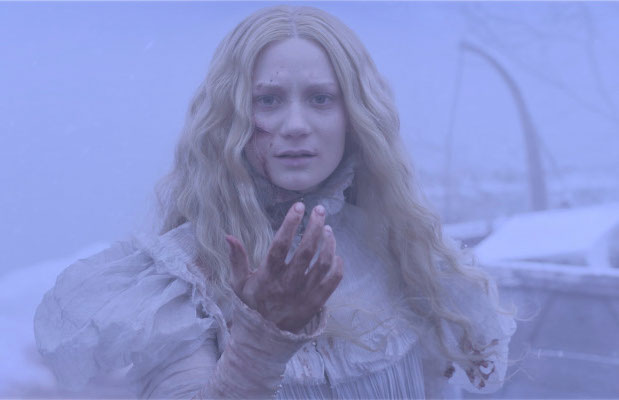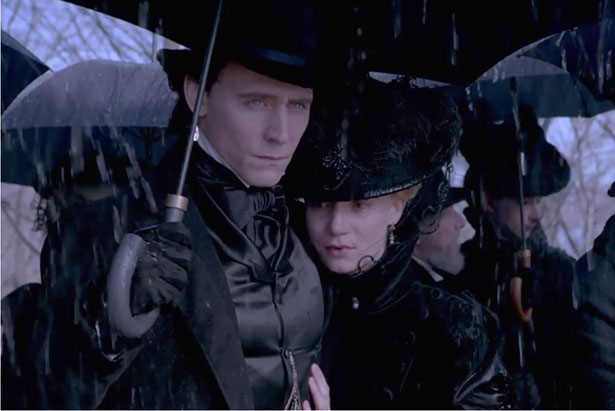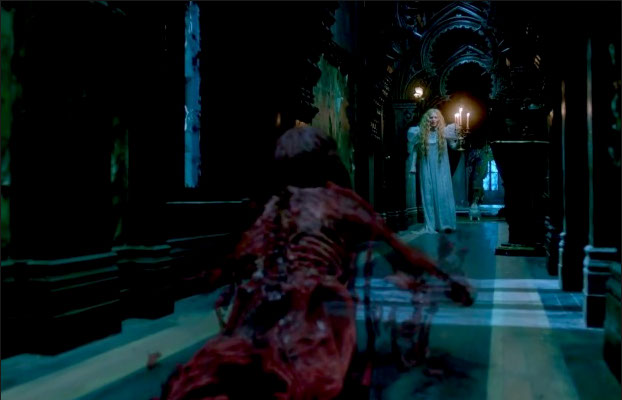
Your feedback and comments are appreciated. See Contact page for e-mails.

Flawed Classic: Crimson Peak
MOVIE REVIEW by Richard Rivera
I have thoroughly enjoyed Guillermo del Toro’s films in the past such as his treatment of Mike Mignola’s Hellboy as well as Pan's Labyrinth and Pacific Rim, and for the first half-hour I felt that Crimson Peak had the look and feel to become a Victorian horror classic. But while Crimson Peak sports many fine elements such as a great cast, truly believable acting, excellent dialogue that was lyrical and well phrased for the Victorian era, outstanding production values, and amazing visualizations through its special effects, there were so many plot holes affecting plausibility (see the Spoilers at bottom) that it severely undercut the structure of motivation and actions of the characters.
If you are a fan of Guillermo del Toro and wish to discover the truth for yourself, then do not read any further. However, if you are a del Toro fan and wish to commiserate over our mutual disappointment of Crimson Peak, read on.
PLOT & SPOILERS
The essential story of Crimson Peak is compelling: Edith Cushing (Mia Wasikowska), a young lady of means who lost her mother at the age of ten and witnessed her ghost, becomes ensnared by a dashing English suitor, Thomas Sharpe (Tom Hiddleston), a man of questionable intent. Sharpe has come to America and approached Edith’s wealthy father in order to finance a mining operation in England. Edith’s father meets with a private investigator, Mr. Holly, who shows him proof that Sharpe is married. Unbeknownst to Edith, her father rejects Sharpe as a suitor and business partner. Sharpe breaks her heart when he declares he is returning to England but gives no explanation. Edith’s mother’s ghost warns her to “beware of Crimson Peak” but she fails to understand the warning.
Coincidentally, as Sharpe is about to leave America, Edith’s father is brutally killed but the death is declared a strange accident. Without her father’s guiding influence Edith marries Sharpe. While living in her new home, his estate in England, she begins to have visions, see ghosts, and make bizarre discoveries as to her husband’s former life.
Spoiler Alert
The following are a series of plot points some minor, some so deeply flawed or confusing as to lead to implausible developments in the story:
1. Early in the film Thomas Sharpe asks Edith to assist him in demonstrating the European waltz at a society party, and in the process humiliates and ignores his scheduled dance partner, Eunice. Both Edith and Eunice exist in a tightly knit upper class society and yet we hear nothing further of the snub, which clearly would have affected Edith’s standing in society.
2. The coincidence of Edith’s father, Carter Cushing, being killed in a an accident a day before Sharpe is about to return to England should have aroused suspicions in Edith, but it does not. Okay, that is borderline acceptable. But what is implausible is the fact that his bathroom injuries don’t appear even remotely accidental. It looks like someone bashed his head in, which is exactly what happened. It is understandable that Edith in her grief would not want his body examined at the moment. However it is not logical that neither his doctor, Charlie Hunnam, or attorney, Ferguson, both his very close friends, would abandon those efforts and leave the riddle of his death unsolved, especially since they both express doubts.
3. Cushing, Edith’s father, is a wealthy and influential businessman in the town. It seems completely implausible that police would not be involved in solving the mysterious circumstances of his death, especially since there were witnesses to the animosity between Sharpe and Cushing.
4. Days before his death Edith’s father meets with a private investigator, Mr. Holly, who shows him proof that Sharpe is already married. It is another reason why Cushing rejects Sharpe as a business partner and suitor. Given the mysterious circumstances of Cushing’s death, why does Holly not go to the police directly? Or inform Cushing’s attorney, Ferguson?
5. Given the fact that Edith had seen her mother’s ghost previously, and been terrified of it, it seems extremely farfetched that she would remain at the Sharpe estate after seeing more horrific visions, and learning that the common name for the estate is Crimson Peak. Anyone in their right mind would run screaming, and yet she remains?
6. Edith has a dream of a ghost pointing in a direction and yet nothing new is revealed in the dream nor does it lead to a specific direction. Why?
7. Thomas Sharpe has been perpetrating his scheme and raising money from luring wealthy young women with no family for years, and yet he does not bother to fix the huge hole in the roof that allows snowfall in the house? That is implausible.
8. Near the climax of the film Sharpe is stabbed in the face slowly (after being stabbed in the chest) and yet is seemingly unaffected. Does he have special powers to deny pain?
Conclusion
I was perplexed that the film had such outstanding dialogue between characters and yet such obvious plot holes and lapses in direction. I can only imagine that Guillermo del Toro created the story lines while Matthew Robbins wrote the dialogue. Robbins has been involved in writing several films since 1977 when he contributed to
Close Encounters of the Third Kind.
I wanted to love Crimson Peak. It’s rare to find a director of del Toro’s abilities and imagination creating a Victorian horror film with such high production values. But at a certain point in watching the film the number of highly visible yet completely implausible plot holes sadly undermined the believability of what could have been a new horror classic.
November 13, 2015
Thomas Sharpe (Tom Hiddleston) consoles Edith (Mia Wasikowska) after the death of her father. And below, Edith sees one of the ghosts that inhabit the Sharpe home also known as Crimson Peak.


Camera Sense Archives
APRIL 2015
Book review
iPad software
Movie review
Underwater dual-use camera review
Photo commentary
Book review
PhotoTech commentary
The Interview, movie review
Photo enhancement or management
MAY 2015
Photo Tech commentary
Photo/Art commentary
Camera review
TV series review
JUNE 2015
JULY 2015
AUGUST 2015
SEPTEMBER 2015
OCTOBER 2015
NOVEMBER 2015
DECEMBER 2015
Copyright © 2015 Richard Rivera & Rivera Arts Enterprises All rights reserved. No copying or reproduction of any kind without express written permission from Richard Rivera
Legal Disclosure Camera Sense and Eagles of New York are trademarks of Elk Partners LLC